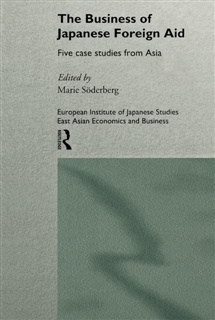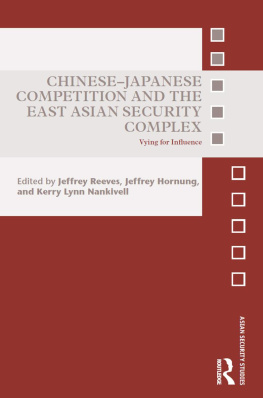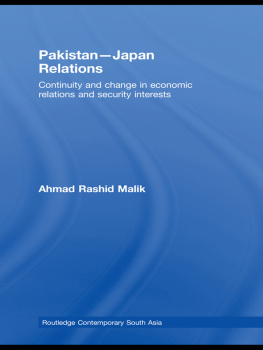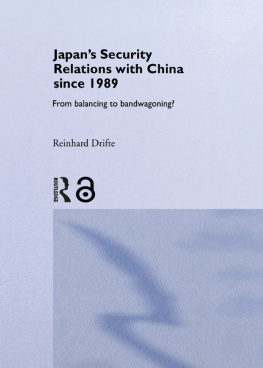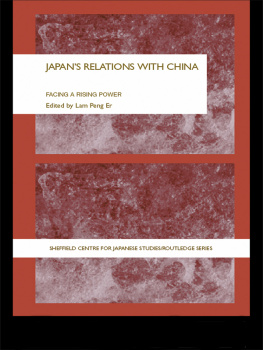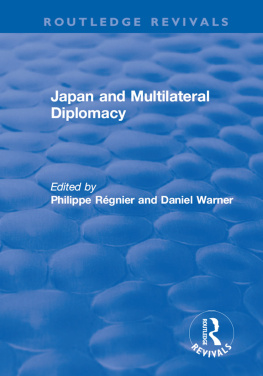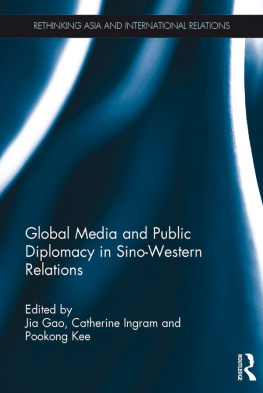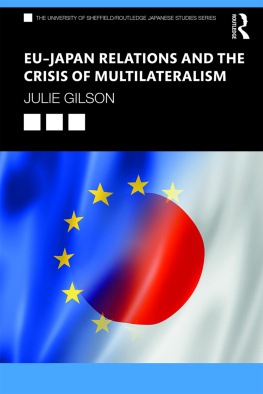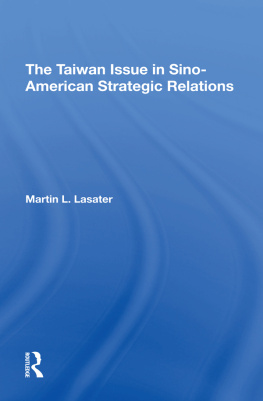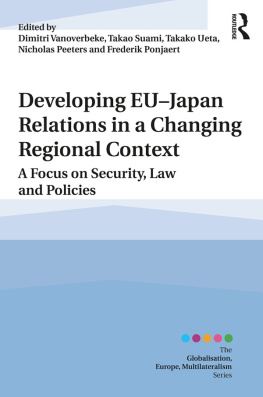Chinese-Japanese Relations in the Twenty-first Century
Today Japan is known as an economic superpower: its presence is ubiquitous in Asian economic affairs, with a 65 per cent share of the regions GDP. But now in the twenty-first century, China with its vast population and its huge potential market is predicted to grow in importance, and some even think it will surpass Japan and become the most significant economic power in Asia. This book examines Chinese-Japanese relations from a number of viewpoints to reveal the history and future of this complex, and crucial, relationship.
Historically, China has significantly influenced Japan, not only theologically and culturally but also within, for example, such disparate fields as state-planning, writing, medicine, mining and irrigation systems. When Japan rapidly proceeded with its industrialisation towards the end of the nineteenth century, its lack of raw materials resulted in a renewed interest in China; and this eventually led to war. Japanese aggression in China left a legacy of bitterness that still informs Chinas ambivalence towards cooperation with Japan. Today, how the two countries interact will have an impact on peace and security in the region as well as on future economic development in the area.
During the 1990s a major focus has been on the two countries economic relationship. This book argues that to achieve a deeper understanding of the bilateral relationship there is a need for more interdisciplinary cooperation and analysis. Chinese-Japanese Relations in the Twenty-first Century is written by eminent international experts whose broad range of disciplinary viewpoints from history and sociology, to politics and economics provide a deeper understanding of one of Asias most critical relationships.
Marie Sderberg is an Associate Professor at the European Institute of Japanese Studies in Stockholm. She came to Japan in 1977 as a news correspondent, also travelling to China. Her works cover issues of Japanese defence, foreign and aid policy. Her most recent publications are The Business of Japanese Foreign Aid and Japanese Influences and Presences in Asia.
European Institute of Japanese Studies East Asian Economics & Business Series
Edited by Marie Sderberg
Stockholm School of Economics, Sweden
This series presents cutting-edge research on recent developments in business and economics in East Asia. National, regional and international perspectives are employed to examine this dynamic and fast-moving area.
1. Chinese Legal Reform
The case of foreign investment law
Yan Wang
2. Chinese-Japanese Relations in the Twenty-first Century
Complementarity and conflict
Edited by Marie Sderberg
Chinese-Japanese Relations in the Twenty-first Century
Complementarity and conflict
Edited by Marie Sderberg
First published 2002
by Routledge
11 New Fetter Lane, London EC4P 4EE
Simultaneously published in the USA and Canada
by Routledge
29 West 35th Street, New York, NY 10001
Routledge is an imprint of the Taylor & Francis Group
This edition published in the Taylor & Francis e-Library, 2003.
Selection and editorial matter 2002 Marie Sderberg; individual chapters the contributors
All rights reserved. No part of this book may be reprinted or reproduced or utilised in any form or by any electronic, mechanical, or other means, now known or hereafter invented, including photocopying and recording, or in any information storage or retrieval system, without permission in writing from the publishers.
British Library Cataloguing in Publication Data
A catalogue record for this book is available from the British Library
Library of Congress Cataloging-in-Publication Data
Chinese-Japanese Relations in the Twenty-first Century : complementarity and conflict / edited by Marie Sderberg.
p. cm. (European Institute of Japanese Studies East Asian economics & business series)
Includes bibliographical references and index.
1. China-Relations-Japan. 2. Japan-Relations-China 3. Twenty-first century-Forecasts. I. Sderberg, Marie. II. Series.
DS740.5J3 C3995 2001
327.5105209051-dc21 2001052014
ISBN 0-203-16713-9 Master e-book ISBN
ISBN 0-203-26193-3 (Adobe eReader Format)
ISBN 0-415-25431-0 (Print Edition)
Tables and figures
Tables
Figure
Contributors
Daqing Yang is Assistant Professor in History and International Affairs at the George Washington University, US.
Quansheng Zhao is Professor and Director of the Division of Comparative and Regional Studies, School of International Service, American University, US.
Reinhard Drifte holds the Chair of Japanese Studies, Department of Politics, University of Newcastle, UK.
Christopher W. Hughes is Associate Fellow, Asia Programme, Royal Institute of International Affairs, and Senior Research Fellow, Centre for the Study of Globalisation and Regionalisation, University of Warwick, UK.
Phil Deans is Lecturer in Chinese Politics, Department of Political Studies, School of Oriental and African Studies, University of London, UK.
Jin Xide is Professor and Director in the Department of Foreign Relations, Institute of Japanese Studies, Chinese Academy of Social Science, China.
Marie Sderberg is Associate Professor at the European Institute of Japanese Studies, Stockholm School of Economics, Sweden.
Hanns Gnther Hilpert works in the Economic Section, German Institute of Japanese Studies, Japan.
Nakagane Katsuji is Professor at the Graduate School of Economics, University of Tokyo, Japan.
Hu Xinxin is Professor at the Institute of Japanese Studies, Chinese Academy of Social Science, China.
Jochen Legewie is Deputy Director of the Economic Section, German Institute of Japanese Studies, Japan.
Preface
The relationship between East Asias two giant powers, China and Japan, has always been and will always be crucial for understanding the development of Asia. The relationship has undergone considerable changes since the end of the Cold War but what we learn about it is often fragmented into different disciplines or knowledge of specific incidents.
With this background, the European Institute of Japanese Studies at Stockholm School of Economics joined forces with the Swedish Institute of International Studies to organise a cross-disciplinary international workshop about the Chinese-Japanese relationship in the first year of the new millennium. We had not anticipated the great interest in this topic and were overwhelmed by the number of scholars from all over the world who were eager to come all the way to another corner of the globe, northern Europe, to present and discuss their research on this topic. We had to make a strict selection between interested applicants, and finally twenty-five scholars from Asia, the Pacific, North America and Europe met in Stockholm in late August 2000. For three very intense days we listened to presentations and discussed the Chinese-Japanese relationship from a number of different angles.
This book is basically built on a selection of the papers presented at the workshop, incorporating into the original versions the comments we made and the discussions we had during the workshop. Where the contents of different papers overlapped, they have been merged. There were many other equally good papers, which we would have liked to be able to include in this volume but were forced to leave out for reasons of space and slightly differing focus. It is our aspiration that this volume will reflect the interesting discussions we had at the workshop and the many angles and views that must be taken into account in an assessment of the Chinese-Japanese relationship and where it is heading.



